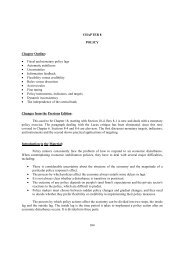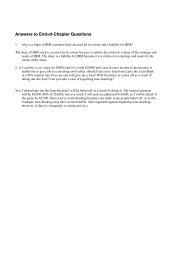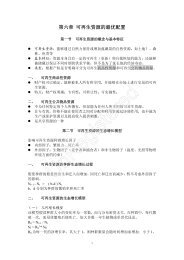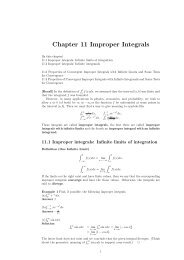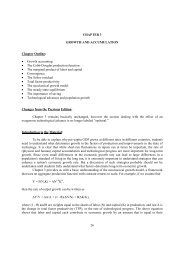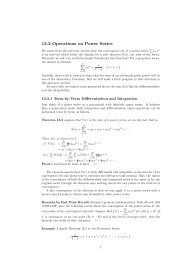- Page 1 and 2:
The Real And Complex Number Systems
- Page 3 and 4:
Proof: Consider 2n−2 ∑ (x + 1)
- Page 5 and 6:
Then S = N. Proof: (A ⇒ B): If S
- Page 7 and 8:
Note: There are many and many metho
- Page 9 and 10:
In addition, (√ a ) 2 − − b (
- Page 11 and 12:
Proof: Say {ar + b : a ∈ Z, b ∈
- Page 13 and 14:
(⇐)It is clear since every a n is
- Page 15 and 16:
Proof: Choose a 0 = [x], and thus c
- Page 17 and 18:
Proof: Use Cauchy-Schwarz inequalit
- Page 19 and 20:
In addition, ∑ a k b k + a j b j
- Page 21 and 22:
So, z 1 z 2 = ¯z 1¯z 2 (c) z¯z =
- Page 23 and 24:
so, |a − b| 2 ≤ ( 1 + |a| 2) (
- Page 25 and 26:
Proof: Note that in this text book,
- Page 27 and 28:
1.39 State and prove a theorem anal
- Page 29 and 30:
1.43 (a) Prove that Log (z w ) = wL
- Page 31 and 32:
For complex θ, we show that it hol
- Page 33 and 34:
So, ix−y = i (x + iy) = iz = log
- Page 35 and 36:
and the sum of their squares is giv
- Page 37 and 38:
Some Basic Notations Of Set Theory
- Page 39 and 40:
(i) If x ∈ R, it is clear that (x
- Page 41 and 42:
(a) A ∪ (B ∪ C) = (A ∪ B) ∪
- Page 43 and 44:
(e) A ∩ (B − C) = (A ∩ B) −
- Page 45 and 46:
Proof: Given x ∈ X, then f (x)
- Page 47 and 48:
By hyppothesis, we get T ⊆ f (S)
- Page 49 and 50:
Proof: Since S is an infinite set,
- Page 51 and 52:
Proof: Assume S˜R and let f be a o
- Page 53 and 54:
2.22 Let S denote the collection of
- Page 55 and 56:
Charpter 3 Elements of Point set To
- Page 57 and 58:
And thus by the remark in (e), it i
- Page 59 and 60:
3.7 Prove that a nonempty, bounded
- Page 61 and 62:
Bx, r x S Bx, r x T . So, at
- Page 63 and 64:
Claim that Bp, r S as follows. Let
- Page 65 and 66:
Covering theorems in R n 3.17 If S
- Page 67 and 68:
uncountable. Hence, by exercise 3.2
- Page 69 and 70:
Then we have (a) (b) (c) (d) x y
- Page 71 and 72:
(b) Give an example of a metric spa
- Page 73 and 74:
Hence from (1)-(4), we know that i
- Page 75 and 76:
3.44 intM A M A . Proof: Let B
- Page 77 and 78:
That is, intB which is absurb. He
- Page 79 and 80:
Limits And Continuity Limits of seq
- Page 81 and 82:
x n1 x n 1 1 x n x n 1 2 . Rema
- Page 83 and 84:
|a m a n| |a m a m1 a m1 a m2
- Page 85 and 86:
and use the fact if a n converges
- Page 87 and 88:
lim y0 fx, y 0ifx 0, 1ifx 0. and
- Page 89 and 90:
fx, y 1 r cos sinr2 cossin if x
- Page 91 and 92:
then we have lim fx, y L if x 0an
- Page 93 and 94:
this is because a can be an isolate
- Page 95 and 96:
irrational. Prove that: (a) ffx x
- Page 97 and 98:
In addition, since f1 f1 by f0 0,
- Page 99 and 100:
lim r n0 fx f lim n x n lim n fx
- Page 101 and 102:
if x Q, andgx 0ifx Q c . Remark:
- Page 103 and 104:
number f T supfx fy : x, y T is
- Page 105 and 106:
Proof: Since the hypothesis says th
- Page 107 and 108:
(f) S 0, 1 0, 1, T 0, 1 0, 1. S
- Page 109 and 110:
In Exercises 4.29 through 4.33, we
- Page 111 and 112:
function. Since f0, 1 0, 1 0, 1,
- Page 113 and 114:
4.40 If x is a point in a metric sp
- Page 115 and 116:
from b to A) are disjoint. So, if e
- Page 117 and 118:
x F k1 F k A B U V which im
- Page 119 and 120:
Proof: Assume that B C 1 is discon
- Page 121 and 122:
Proof: By Mean Value Theorem, wehav
- Page 123 and 124:
x r y r rz r1 x y ry r1 /2. So,
- Page 125 and 126:
hx gfx if x S. Iff is uniformly c
- Page 127 and 128:
dx, y , x, y A, wehave dfx, fy
- Page 129 and 130:
In addition, part (b) comes from in
- Page 131 and 132:
continuous at a, a. (2) (x y) Sinc
- Page 133 and 134:
Proof: Let D denote the set of dico
- Page 135 and 136:
(a) Provet that the formula df, g
- Page 137 and 138:
so, by induction, we find dp n1 , p
- Page 139 and 140:
Proof: If p and p are fixed points
- Page 141 and 142:
(b) Assume there is a subsequence p
- Page 143 and 144:
Hence, f is increasing on , a/3 a
- Page 145 and 146:
f k x f k 0 x 0 fk x x by induct
- Page 147 and 148:
h k1 h k k jk f j g kj x j0
- Page 149 and 150:
g x g x 3 2 a d f x a d f x 3 2
- Page 151 and 152:
which implies that F 0, where
- Page 153 and 154:
g fx gfx. Assume that there is a
- Page 155 and 156:
Remark: For x 0, we can show that
- Page 157 and 158:
Proof: Look at the Generalized Mean
- Page 159 and 160:
Proof: By Generalized Mean Value Th
- Page 161 and 162:
there is a point p such that fp 0.
- Page 163 and 164:
Remark: If we can make sure that fx
- Page 165 and 166:
which implies that Hence, g 1 h g
- Page 167 and 168:
fx fy x y f x /2 *’ Combi
- Page 169 and 170:
lim xa fx gx L. Remark: 1. The pr
- Page 171 and 172:
every g k is never zero in c , c
- Page 173 and 174:
f x 1 ...x n n f x 1 ...x n1 n x
- Page 175 and 176:
f x 1 ...x n n fx 1 ...fx n n . C
- Page 177 and 178:
lx fc f cx c fx. (Exercise 2)
- Page 179 and 180:
So, we have Partial derivatives fb
- Page 181 and 182:
ux, y ey e y cosx 2 and vx, y e
- Page 183 and 184:
ux, y (1) arctany/x, ifx 0, y R
- Page 185 and 186:
Functions of Bounded Variation and
- Page 187 and 188:
For the part fx x fy 1 |fx fy| 1
- Page 189 and 190:
Claim that 1 sup A. Suppose NOT, t
- Page 191 and 192:
we know that V f is an increasing
- Page 193 and 194:
in Section 6.12. Proof: Sinceft : t
- Page 195 and 196:
2n h P 2 hx i hx i1 i1 n 2n
- Page 197 and 198:
n k1 n ||fb k | |fa k || |fb k
- Page 199 and 200:
Supplement on lim sup and lim inf I
- Page 201 and 202:
(1) lim n→ inf a n − a n has
- Page 203 and 204:
Remark: The exercise is useful in t
- Page 205 and 206:
which implies that c ≤ a b since
- Page 207 and 208:
If lim sup n→ a n1 a n , then it
- Page 209 and 210:
We first prove lim n→ sup n ≤
- Page 211 and 212:
0 ≤ d 1 * by Theorem 8.23 (i). N
- Page 213 and 214:
Consider which implies that which i
- Page 215 and 216:
So, L 1 5 since L ≥ 1. 2 Remark:
- Page 217 and 218:
For case (i), since 1 n log nlog lo
- Page 219 and 220:
()Assume that ∑ n1 That is, p!
- Page 221 and 222:
n S n ∑−1 k1 1 3k − 2 − 1
- Page 223 and 224:
(b) Prove that ∑ n1 −1 n−1 /
- Page 225 and 226:
then b k sin kx, a k1 − a k 1
- Page 227 and 228: diverges, then ∑ where By (2) and
- Page 229 and 230: Suppose NOT, it means that lim n→
- Page 231 and 232: then since n lim n→ ∑ k1 n S n
- Page 233 and 234: |sin k|r ∑ k So, ∑ |sink|r dive
- Page 235 and 236: n For the part 1 2 0 that x sint
- Page 237 and 238: lim n→ sin ... sin n 1 ... 1 n
- Page 239 and 240: Also, lim q→ fp, q lim q→ p si
- Page 241 and 242: n c n ∑ a k b n−k k0 n ∑ k0
- Page 243 and 244: So, n s n ∑ cos2k − 1x j1 sin
- Page 245 and 246: n u n ∑−1 k a k k1 n ∑−1
- Page 247 and 248: which implies that which implies th
- Page 249 and 250: So, by above sayings, we have prove
- Page 251 and 252: (a) If fn is multiplicative and if
- Page 253 and 254: Sequences of Functions Uniform conv
- Page 255 and 256: (b) Prove that h n (x) does not con
- Page 257 and 258: Proof: Since g is continuous on a c
- Page 259 and 260: Hence, {g (x) x n } converges unifo
- Page 261 and 262: y continuity of f k(x0 ) (x) − f
- Page 263 and 264: In addition, as c ≥ 1/2, if f n
- Page 265 and 266: (Lemma) If {a n } and {b n } are tw
- Page 267 and 268: 9.16 Let {f n } be a sequence of re
- Page 269 and 270: which implies that ∣ lim sup 1 k
- Page 271 and 272: have ∫ x 0 ∞∑ t 2n − 1 2 n=
- Page 273 and 274: [ ] π And as x ∈ , π , then n+p
- Page 275 and 276: 0.1 Supplement on some results on W
- Page 277: which implies that h (x + t) − h
- Page 281 and 282: we complete it. 9.31 Given that two
- Page 283 and 284: if x = λ (≠ 0) is a root of 1 +
- Page 285 and 286: So, the series diverges. (ii) As
- Page 287 and 288: 9.38 For each real t, define f t (x
- Page 289 and 290: So, B 0 = P 0 (0) = C 0 = 1, B 1 =
- Page 291 and 292: Remark: (1) The reader can see the
- Page 293 and 294: That is, lim n inf a n sup c n . n
- Page 295 and 296: and lim n infa n b n lim n a n
- Page 297 and 298: q! kq1 1 k! kq1 q! k! 1 q 1
- Page 299: g x log 1 1 x x a x 2 x log




